The Scarpa Moraine is a family of low and mid-cut trail shoes and walking boots that occupy the lower rungs of the Italian brand’s extensive product range. In terms of design and price point, Scarpa aim for them to be accessible, best suited to day hikes and easier treks of varying distance and duration.
Scarpa describes it as the ideal first boot for those who are new to the worlds of hiking and hillwalking. When we tested the low-cut Moraine trail shoe last year however, we found that description undersold its capabilities somewhat, since it proved a lot more adept than expected.
Indeed, when it comes to ‘on the hill’ prowess, the Moraine family is undoubtedly a step up from the brand’s classic, traditional leather Cyrus and Terra models, as well as the suede Mistral GTX boot, all of which are primarily intended for low level or countryside walks.
In terms of pricing and positioning, the Moraine sits broadly alongside the Rush 2 and Rush Trk series of boots, both of which we’ve also tested here at LFTO. We were very impressed. However, whereas those models are descended from Scarpa’s speed hiking product lines, the Moraine is focused on all-round versatility and all-day comfort.
Don’t get too hung up on this though, since all the weights are broadly comparable (for the nubuck leather models at least). For reference, the Rush 2 Pro Mid weighs in at 445g in an EU 42, while the Rush Trk Pro is 580g. The two Moraine styles sit in between. The standard Moraine Mid tips the scales at 530g, while the Moraine Mid Pro is 555g.
If you’re a bit confused about the differences between the standard and pro models, the Moraine Mid Pro that we’re testing here has a slightly higher ankle construction, offering a little more structure, protection and support for the foot. Uppers are made from the same quality oiled nubuck leather and lined with the same Gore-Tex waterproof-breathable membrane. The sole unit is also identical.
 LFTO
LFTOwww.nevisport.com
Pros
- Sturdy
- Protective
- Reliable traction
Cons
- Firmer feel underfoot than some rivals
| RRP: | £200 |
| Construction: | Oiled nubuck leather |
| Waterproofing: | Gore-Tex liner |
| Outsole: | Presa Supergum HK-04 |
| Sizes: | EU 41-48 (men's), EU 36-42 (women's) |
| Weight (per shoe): | 555g / 1lb 3.6oz (men’s EU 42/UK9) |
Design and features
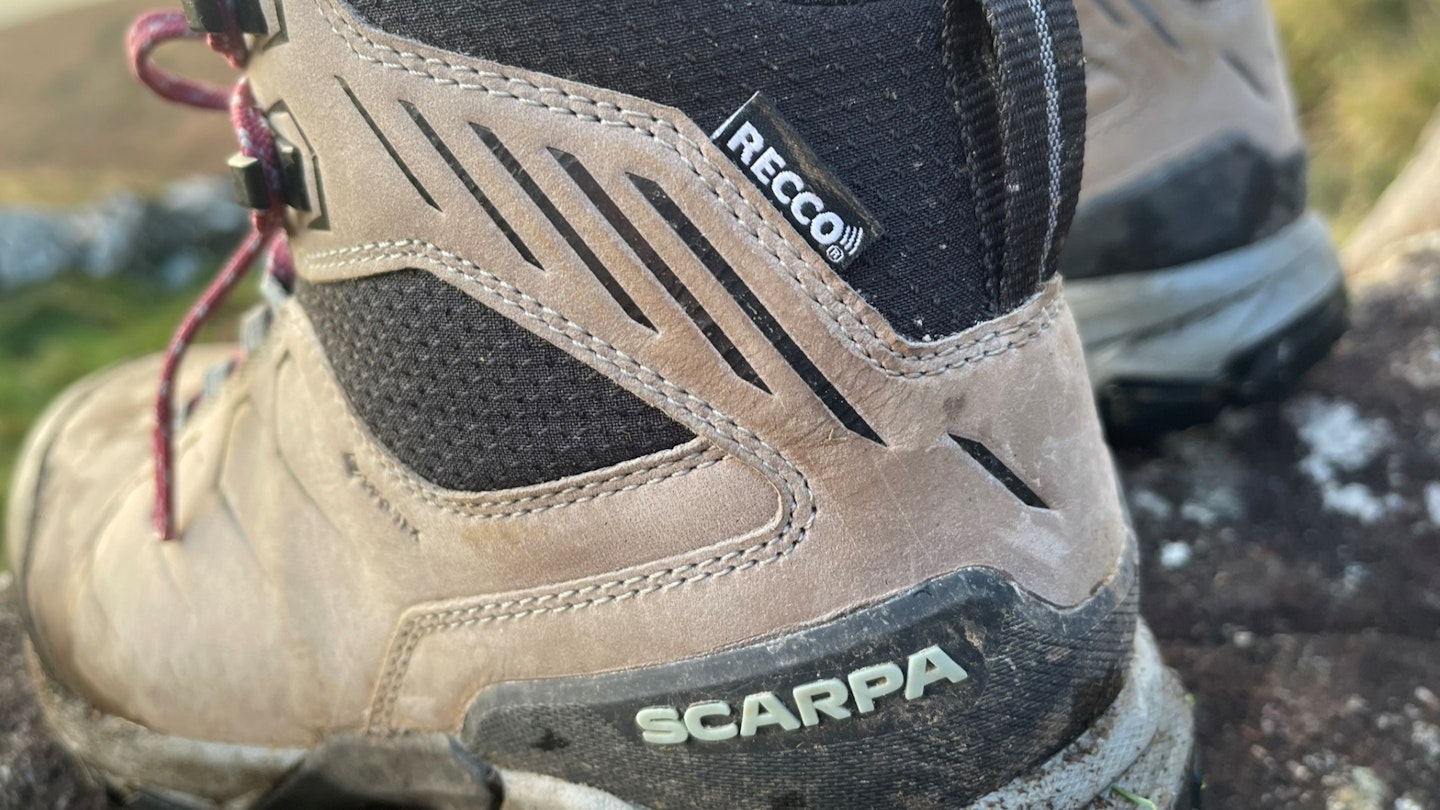
This boot is constructed from high-quality materials, with uppers built from 1.6 to 1.8mm Idro oiled nubuck leather. There are abrasion-resistant textile panels at the tongue, around the ankle collar and at the ankle flex point for additional comfort, padding and mobility.
A rubber toe cap and heel counter add further structure, protection and durability. Uppers are also lined with a waterproof Gore-Tex Bluesign-approved membrane, which is PFCec-free (Gore’s terminology for ‘perfluorinated compounds of environmental concern’).
The collar and tongue have more generous padding than the Scarpa Rush Mid models, ensuring high comfort levels. The lacing system mostly employs a series of webbing lace loops rather than eyelets, with metal speed hooks used for the two top sets. The tongue is gusseted up to the base of the ankle, which works with the Gore-Tex liner to minimise water ingress.
Unusually, the uppers also feature a built-in RECCO reflector for traceability in the event of an emergency. It’s a slightly unusual feature for footwear, and one that is also included in the Moraine trail shoe.
If you haven’t come across this system before, it’s essentially a hidden passive transponder, which does not require batteries or activation, consisting of a diode and an antenna. Its dimensions are 13mm × 51mm × 1.5mm and it weighs just 4g.
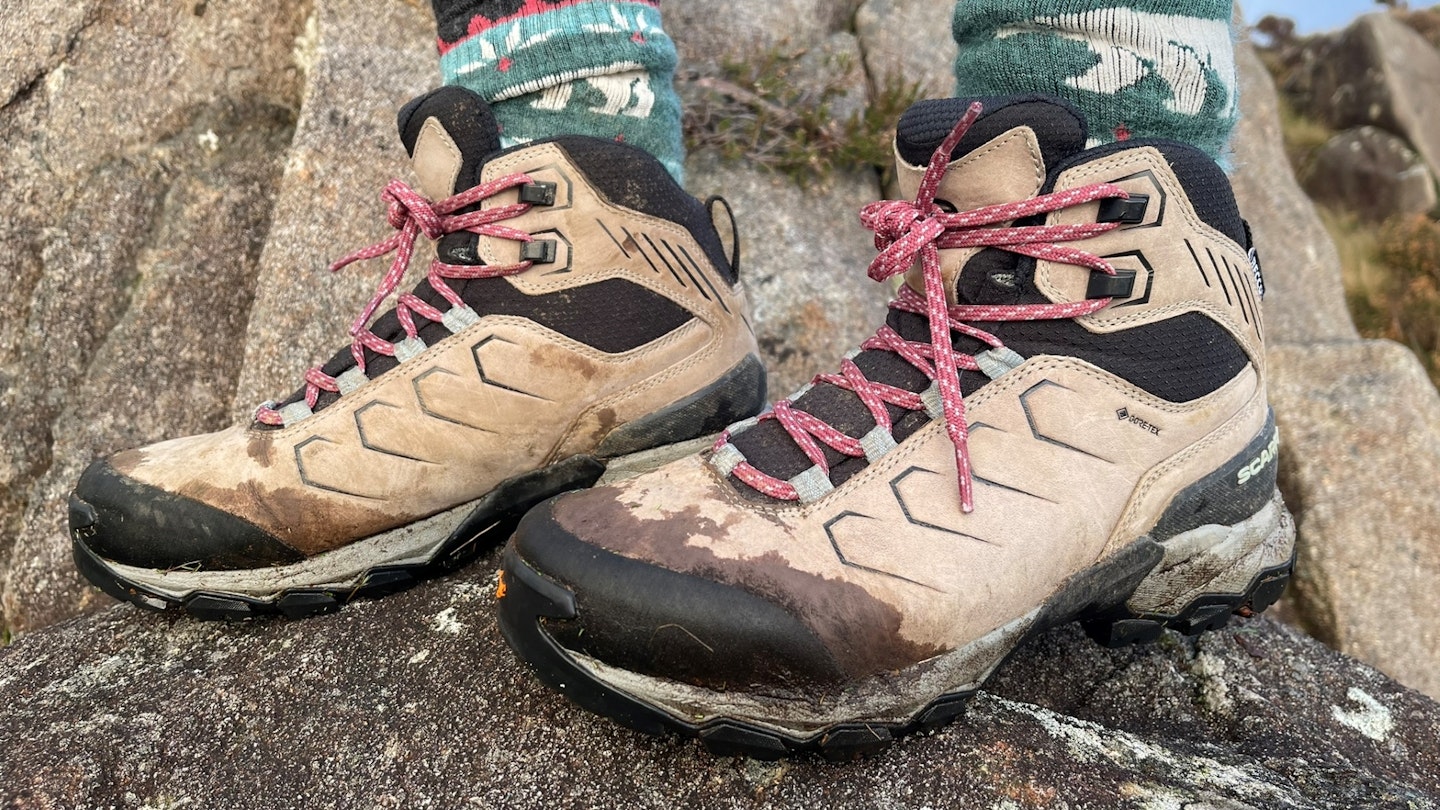
Given its low weight and compact dimensions, the tech is increasingly being integrated into a lot of modern outdoor clothing and apparel. It can be used in conjunction with search and rescue teams’ portable detectors, which bounce a signal back from the reflector. If the wearer is lost in the mountains, this can be a handy additional safety measure.
Currently, it’s more useful in Europe than the UK, since most of our Mountain Rescue teams aren’t equipped with the RECCO detectors. So, think of it as a ‘nice to have’ feature rather than an essential safety measure.
The midsole features double density PU foam rubber with a built-up heel to increase walking comfort, plus a medial shank to add a little stiffness and stability. The heel and midfoot are noticeably more structured than many trainer-style hiking boots, though there is still plenty of flex in the forefoot to ensure a natural and comfortable walking action.
The use of PU foam rubber means the Moraine feels a little more solid underfoot than boots with EVA foam rubber midsoles, but this also means the midsole will be more resistant to long-term compression. It also ensures a stable platform with plenty of lateral stability, reducing torsional twisting that can stress or fatigue the foot.
Performance and comfort
In terms of fit, the Moraine range is built on Scarpa’s Activ Fit lasts, which are developed separately for men and women, to ensure improved fit for the different anatomies of the typical male and female foot. Both have some similarities though, sharing a roomy forefoot with a broad, blunt toebox.
This ensures ample space for toes to splay but feels a bit clumpier and less precise than some trail shoes. Similarly, at the rear they hug the heel fairly well but aren’t as locked-in as trail shoes that have more of a running shoe-derived fit.
As is common in the latest generation of Scarpa footwear, the Moraine features an outsole made from the brand’s own Presa Supergum compound. The specific sole unit used for this shoe is the HK-04 pattern, a hiking-focused lug arrangement designed to offer versatile all-round performance on mixed terrain.
On test, the widely spaced lugs cleared out mud well but still gripped competently on sticky mud and slick grass. A pronounced heel brake with blocky, undercut lugs provides reassuring traction when descending. There are enough flat sections of rubber at the edges of the outsole to deliver decent contact grip too. So, it certainly does its job as promised – overall, we're impressed.
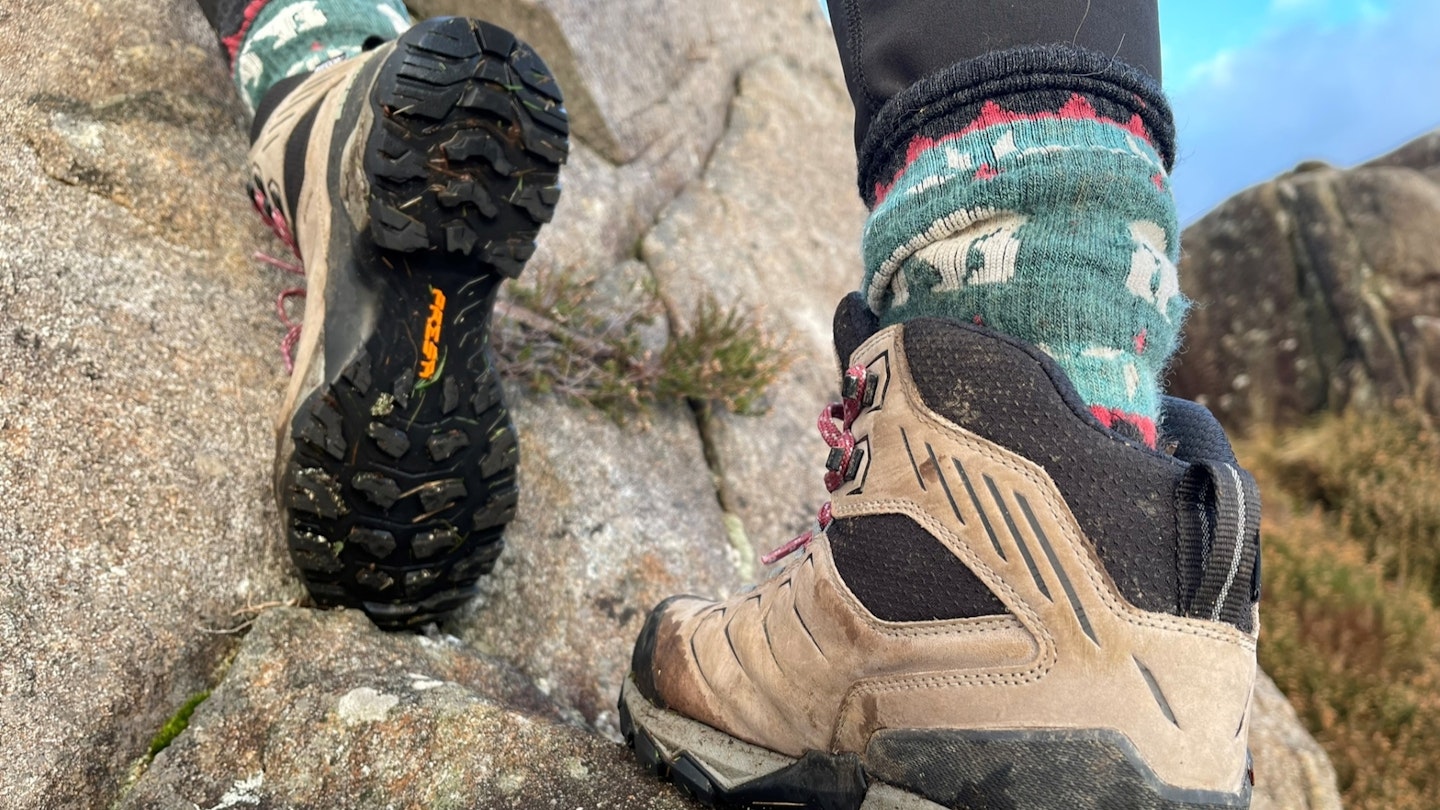
Scarpa markets the Moraine as the ideal entry-level boot for novice and beginner hikers. While that makes sense in the overall profile of the brand’s product range, it undersells the Moraine’s capabilities a little. After all, this is no flimsy trainer-style hiker. It has the same durable oiled nubuck leather uppers and structured sole unit as many of the brand’s burlier boots.
So, in terms of stability, structure and protection, it outperforms a lot of lightweight mids, especially when it comes to more demanding hill and mountain routes. The downside is that they inevitably feel a bit firmer and heavier on the feet.
But this is almost always the price you pay for durability, and the Moraine is undoubtedly a solidly built shoe – as you’d expect from Scarpa, which is one of the outdoor industry’s longest-established and most highly regarded bootmakers.
Admittedly, the Moraine’s slightly lower price point compared to other Scarpa trail hiking shoes mean you don’t get some of the fancier on-board tech found in boots like the Rush, such as Scarpa’s IKS ‘Interactive Kinetic System’, which consists of five concave impact zones (four in the forefoot, one in the middle of the heel) that compress as they touch the ground.
The Moraine also lacks the memory foam ankle padding of the pricier Scarpa models. But otherwise, the materials and overall build quality are excellent.
Price and competition
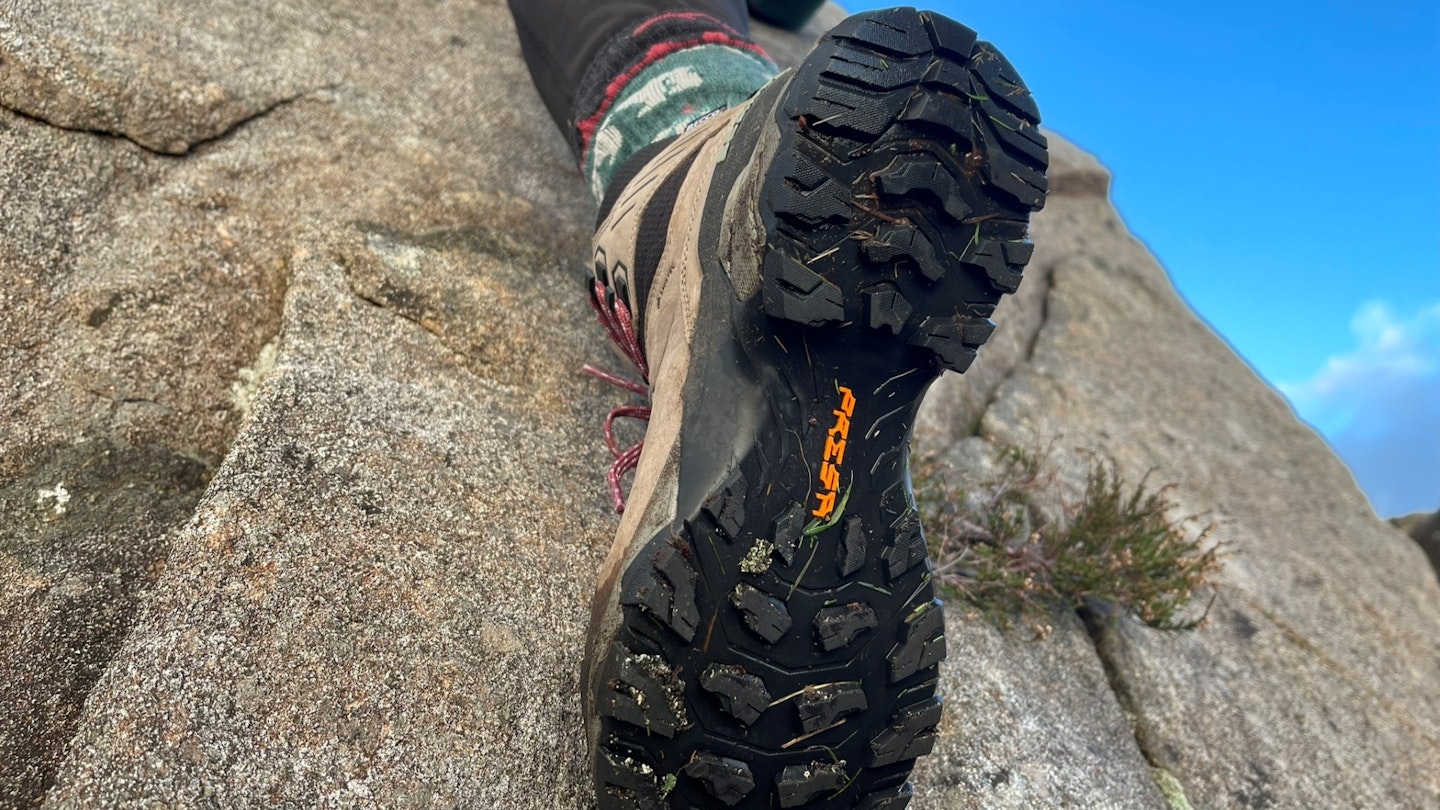
With a UK RRP of £200, the Moraine Pro Mid is at the top end of the market for a mid-cut hiking boot, even one with premium leather uppers. That price point puts it in the same ballpark as burlier hillwalking boots like the Salomon Quest 4, AKU Tribute II and the Lowa Renegade Mid.
There’s also the excellent and very capable Salewa Alp Trainer 2 Mid (our overall Best in Test for 2024). Or you could buy a pair of classic all-leather hillwalking favourites like the Berghaus Fellmaster Ridge (£180) or the Supalite II (£185) instead and still have a couple of notes left in your pocket.
So, are you paying more for less with the Scarpas? Depends on your point of view. After all, you’re getting the brand’s trademark build quality, backed with a two-year warranty. And although these are positioned at the ‘entry level’ end of their product line, it’s worth remembering that at the other end of the spectrum, Scarpa makes some highly technical mountaineering boots.
So, although marketing the Moraine as a beginner boot might make sense from a brand perspective, it definitely undersells its capabilities, especially in a UK context. This is definitely a boot that is well equipped for three-season hillwalking.
Admittedly, we’d advise you to look elsewhere if you want a dedicated backpacking boot or more hardcore, mountain-ready pair of technical scrambling shoes, but as a general all-rounder, this is a good choice.
Sustainability
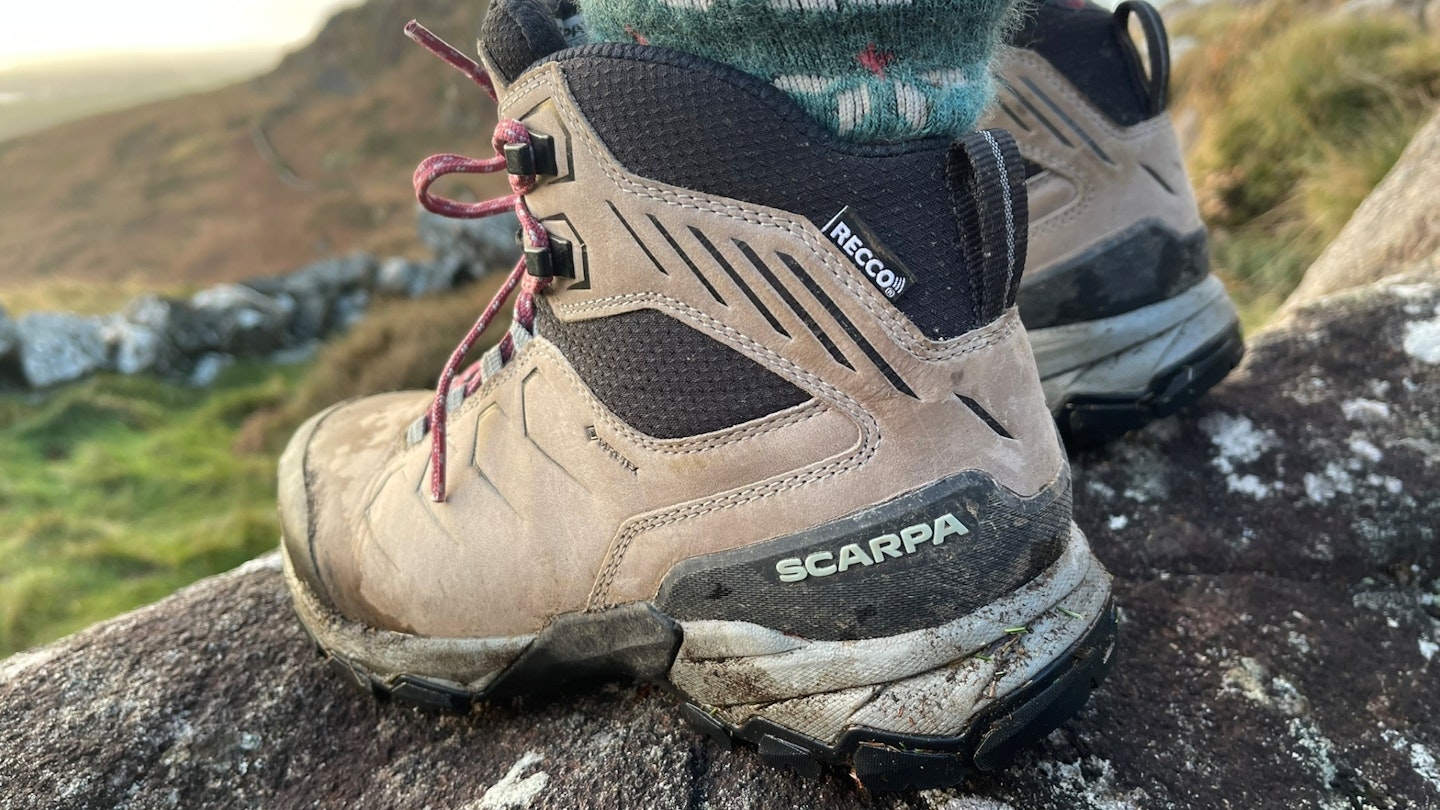
Apparently, 90% of Scarpa’s manufacturing and materials supply chain is sourced from Europe. Many of its boots are Italian-made for a lower carbon footprint and easier monitoring and auditing of factory conditions and standards. Unfortunately, the Moraine Mid Pro isn’t one of them. The tongue label reveals that this particular model is made in Vietnam.
However, the boot is made from quality materials such as nubuck leather. It also has a Gore-Tex liner, which is Bluesign-approved and PFC-free. Being leather means the boot is obviously not vegan-friendly, but you should expect decent lifetime durability, which is a plus in terms of sustainability through longevity. These boots can also be resoled to further extend their effective lifespan.
In July 2023, Scarpa also achieved B-Corp status, a designation that identifies companies that, along with profit, pursue goals that have common benefit with the aim of generating value for the public and the planet.
The company has committed to a series of actions with specific objectives as part of its Green Manifesto, which includes reducing the impact of production processes, creating products that are more durable and pollute less, studying circular alternatives for the end-of-life management of footwear and experimenting with totally recycled and certified materials. However, it’s not clear what, if any, recycled content the Moraine Mid Pro GTX boot contains.
Verdict
A sturdy and well-built mid-cut leather boot that strikes a great balance between cushioning, stability and durability.
Shop this product
About the author

Matt Jones is a freelance journalist based in the heart of Snowdonia National Park, he’s a vastly experienced gear tester and self-confessed outdoor kit geek. Matt’s been one of our main gear testers for the last couple of years and is the first person we call with any complicated kit queries that need in-depth and forensic analysis.
